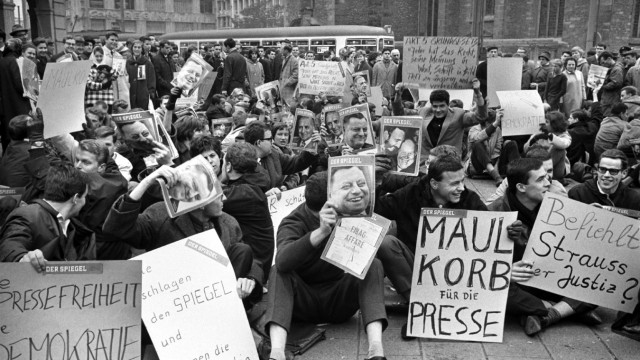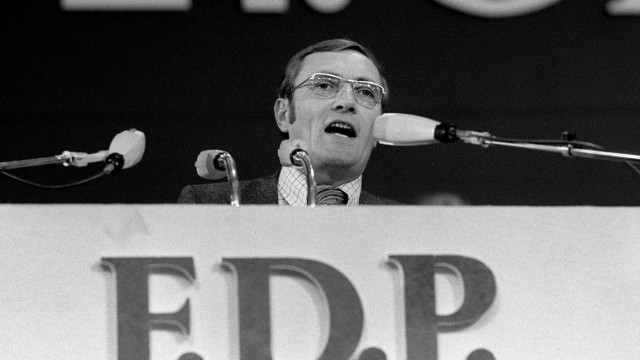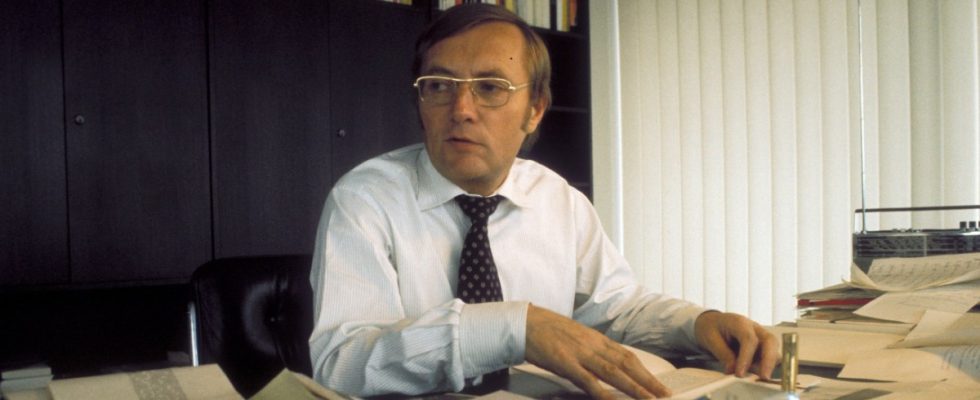The cameras, insatiable as they are, needed this, so the red cloth with the coat of arms of the Free and Hanseatic City of Hamburg had to be pulled over again, and the new name was revealed once again: Rudolf-Augstein-Promenade. The historically studded one Mirror-Editor-in-chief Dirk Kurbjuweit immediately thought of the scene at the end of the war in Berlin in 1945, when the Soviet soldiers planted their flag a second time on the captured Reichstag, because the newly captured clocks were clearly visible in the first photo.
It was undoubtedly another historic moment early on Thursday afternoon at the Ericusspitze in the port of Hamburg, where the Mirror resident since 2011, a traitor was honored with a section of street. This Sunday would be Rudolf Augstein, who has never been on the promenade much, but who has given the country the honor Mirror bequeathed him, turned 100 years old.
On Friday evening, Federal President Frank-Walter Steinmeier wanted to honor the jubilarian with a speech, and in another celebration on Sunday, his actual birthday, the program even puts him close to Heinrich Heine. That’s not entirely wrong, because Augstein always wanted to write, but he also always wanted to be more than just a journalist.
In the beautifully restored Old Customs House, Culture Senator Carsten Brosda opened the “Rudolf Augstein Festival” on Thursday and organized the event Mirror and its founder discussed communication theory and the “urban context” with proven eloquence, spoke of “consensus” and “markings” and did not forget to mention the “assault gun of democracy”, which the former first lieutenant Augstein called his Mirror praise. He only had no word for the young poet Augstein.
Adenauer hated “Spiegel”. But: “Unfortunately, this piece of paper will be read by God!”
“The arms of the well would not rise so steeply/towards the sky if the water were not deep/in the bottom of the ground. But no bucket makes a noise because/They are silent like the land that slept forever.” The enjambment is bold, the inverted genitive “in Bodens Grund” is even more daring – the best pathos for humanity or whatever you can put together when you’re 19, clueless, just gone to war and then standing, shaken, in front of a “well in the Ukraine”.
But how fortunate that the poet Augstein was misunderstood back then! He tried again in 1947 in Hanover. The theater director, a friend of the family, brought the heavily allegorical work “The Time is Near” to the stage, where it was a resounding success. One review said: “The inadequacy, here it becomes an event. (…) On the stage, in the midst of the renaissance he had conjured up, the author, a not very tall gentleman who looked older than his 24 years, bowed: Rudolf Augstein, License holder and editor-in-chief of the much better magazine The mirror.” And this editor-in-chief had the greatness to publish the review in his own paper.
Augstein with his long-time office manager Irma Nelles.
(Photo: Private/Aufbau Verlag/dpa)
The pathos had hardly subsided when Augstein, under his pseudonym Jens Daniel, explained to readers in 1952 what the policy of unconditional ties to the West that Federal Chancellor Konrad Adenauer was pursuing meant, namely “farewell to the brothers in the East.” At night in the Braunschweig train station he vows with the GDR philosopher Wolfgang Harich to complete the unity of Germany.
The SPD was paralyzed, the KPD had been banned in 1956, so that Mirror acted as almost the only opposition in the chancellor’s democracy. The former MirrorEditor and later State Secretary Günter Gaus impressively described the power of the magazine: “On Monday morning on the D-train to the federal capital, when everyone but one in the compartment Mirror When I read it, I thought as a fellow traveler: If you only knew which secret lodge I belong to.”
Adenauer hated him Mirror. “Unfortunately, this piece of paper is being read!” he groaned in front of witnesses. He watched in horror as circulation increased year after year. The paper started out with 15,500 copies sold, and by 1960 it had already sold 400,000. Adenauer fervently hoped for economic ruin and would have liked to have helped. “I wish three or four more numbers could be confiscated in a row.”
In 1962 it almost succeeded. Then the Bonn security group appeared at the Hamburg press house and arrested Mirror-Editors on suspicion of treason – it was about alleged military secrets that the Mirror had published. Actually, it was a joint attempt by the Federal Prosecutor’s Office and Defense Minister Franz Josef Strauss, whom Adenauer supported, to put an end to the magazine. The accusation of treason was unfounded.

Protests against the arrest of magazine editors in the “Spiegel” affair in 1962.
(Photo: Heinz-Jürgen Göttert/dpa)
Augstein has never been more popular. In a prayer room in the Old Customs House, devotional items have been brought together that commemorate this high point in the magazine’s 76-year history, including a letter from a student who sends the prisoner Augstein pear bread, an Allgäu specialty. The Italian publisher Giangiacomo Feltrinelli sent a fraternally revolutionary, accent-free telegram: “Liberte, egalite, fraternite.”
The writers of Group 47 feared the worst and sent encouraging greetings to Hamburg. “The undersigned – including Ingeborg Bachmann, Hans Magnus Enzensberger, Uwe Johnson, Alexander Kluge and Martin Walser – express their respect for Mr. Rudolf Augstein and stand in solidarity with him. At a time that has made war useless as a means of politics They consider informing the public about so-called military secrets a moral duty that they would fulfill at any time.”
The protests helped. Surprisingly, the affair ended well in the Federal Republic, which was still governed by a fairly authoritarian state: the authorities lost, freedom of the press triumphed. Strauss was overthrown. When he ran against Helmut Schmidt in the 1980 federal election, he lost, not least because the authors’ film publisher, which was financed by Augstein, supported the joint effort The candidate brought to the cinema and warned about Strauss as a threat to democracy.
Sometimes he was attracted by the FDP, sometimes by Jesus, but his posthumous fame, Augstein knew, was the “Spiegel.”
At the end of the Adenauer era, Augstein once again settled accounts with his other favorite opponent: “Democracy is holding people responsible and making them responsible. His system of rule, on the other hand, was based on the principle of considering everyone immature and keeping them immature.” But that was a subsequent reassurance from Immanuel Kant. It was never their intention to fight for democracy, explained long-time editorial director Hans Detlev Becker in an interview with the in 2007 Mirror, Not his, and not Rudolf Augstein’s either. “As I understood it, our task was to ensure cleanliness in the state and economy or to fight.” That’s exactly what it was for Mirror invented.
Augstein became less and less interested in this; as soon as success overtook him, he strove for the outdoors. He wanted the high-deficit one Time buy, planned an FDP weekly newspaper, an anti-Springer newspaper and just wanted to write. He rejuvenated himself, not least thanks to his third wife, Maria Carlsson, who introduced him to Group 47. He viewed the student upheaval of the 1960s with favor. At the 1967 book fair, an enthusiastic audience invited him to take a seat on the podium. When he returned to Hamburg, the almost 44-year-old explained his enthusiasm for young people to the astonished editors: “Basically, I have inner access to them.” With the intention of making his paper more politicized again, he brought Günter Gaus to the magazine in 1969 and columned with him in pairs to bring about the change of power to the social-liberal coalition. At the same time he wrote a book on the most contemporary topic, “Prussia’s Frederick and the Germans”.
The Mirror was never enough for him, he grew increasingly tired of it and yet knew that his reputation and even more so his posthumous fame were tied to it. In 1971 he gave half to the employees. With that he has it Mirror ensured independence, but also caused regular chaos in the appointment of the editor-in-chief.
It was his increasing dissatisfaction with his own creation that made him run for the Bundestag in 1972. Augstein came to Bonn via the FDP state list. No one was waiting for him there, and after less than three months he was back in Hamburg. But he was neither a boss nor a politician; At the same time he had written a theological treatise, “Jesus Son of Man”.

Augstein 1973 at the FDP party conference in Wiesbaden.
(Photo: imago/Sven Simon)
Augstein’s last triumph was unity in 1989. With all honesty he was able to avoid it for years Mirror congratulate the kidding Helmut Kohl. The Mirror-Monday’s column, with which he encouraged the procrastinators and doubters, appeared at the same time in the only black, red and gold background Picture, and Günter Grass, who could no longer imagine Auschwitz as a union of the two states because of the legacy of Auschwitz, said time and again in a television conversation: “The train has left!”
At a Mirror-Conversation on his 75th birthday In 1998, Martin Walser listened patiently as his friend Augstein once again brought out the assault guns of democracy and prepared a consistent bildungsroman as his CV. Walser praised the story in Bodens Grund: “Rudolf, you are really the best, most beautiful, most lovable, safest novel, the most heartwarming, that I have ever read. (…) It can have nothing to do with reality. ” To which the poet Augstein replied: “It is experienced reality, not glossed over.”

